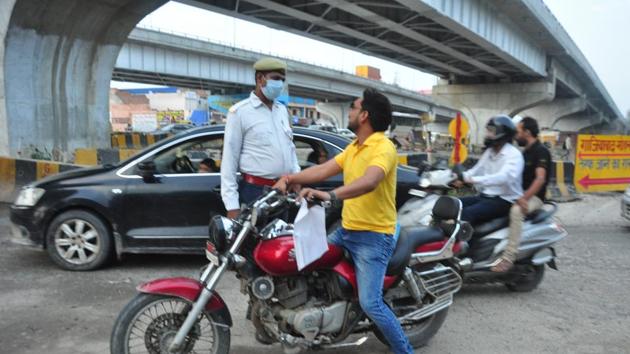New Motor Vehicles Act comes into force, ...but ‘concession’ for traffic offenders in Uttar Pradesh to continue
Though the amended MV Act, providing for enhanced (hefty) fines and penalties, came into effect across the country from Sunday, but in UP, like in many other states, people can continue to get their offences compounded out-of-court on the spot on the old rates prescribed by the UP government in June this year.
In what can be seen as a ‘concession’ to traffic offenders in Uttar Pradesh, they can continue to get away with relatively milder fines with regard to majority of traffic offences till the state government issues a notification revising the compounding fees in the light of the Centre’s Motor Vehicles (Amendment) Act that came into force on Sunday.

Though the amended MV Act, providing for enhanced (hefty) fines and penalties, came into effect across the country from Sunday, but in UP, like in many other states, people can continue to get their offences compounded out-of-court on the spot on the old rates prescribed by the UP government in June this year.
The central government has the power to fix fines and penalties for violation of rules of the road but the law allows states to fix compoundable fees with regard to minor offences that can be settled out-of-court with mutual agreement between an accused (traffic violator) and the prosecutor (police).
The compoundable fees, however, always has to be lower than the maximum fine and penalty prescribed by the centre under the MV Act.
“The transport department is working on a new proposal seeking to revise the compounding fees for various traffic offences and the same will be sent to the government shortly for the cabinet’s nod,” additional commissioner, transport, AK Pandey said.
The revision of compounding fees, he said, was necessary due to various changes made under the amended MV Act that had added some new offences to it and converted some non-compoundable offences into compoundable ones and vice versa.
“People have the option to get their compoundable offences compounded at the old rates till the state government comes out with revised fees,” Pandey said, adding, “But if they do not opt for compounding, then their challans will be sent to courts that will decide the fine amount which cannot be more than the penalty prescribed under the MV Act,” he said.
According to Pandey, the amended provisions with regard to non-compoundable offences that are settled by courts and the compoundable offences that go to courts have already come into effect and the state government’s notification does not have to do anything with such cases.
Majority of offences under the MV Act are compoundable. There are only a few traffic offences of more serious nature that are non-compoundable and cannot be compromised. Courts can decide such cases.
Among such offence come drink driving, obstructing an ambulance, knowingly driving a defective vehicle in public place, driving of a vehicle by a minor and unauthorized sale of travel ticket for a public vehicle.
In June, UP made a hefty increase in compounding fees wherein compounding fee of ₹2,000 for over-speeding by light motor vehicle (LMV) and ₹4,000 by medium and heavy vehicles are far greater than ₹1,000 and ₹2,000, respectively, fixed under the MV (Amendment) Act, 2019.
The UP government, sources said, would have to lower these amounts below the new fine prescribed by the central law. “In other cases, the government may increase the compounding fee only slightly or may not increase them at all because it made manifold increase in the compounding fees in June itself,” sources said.






